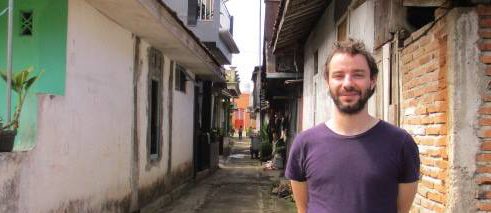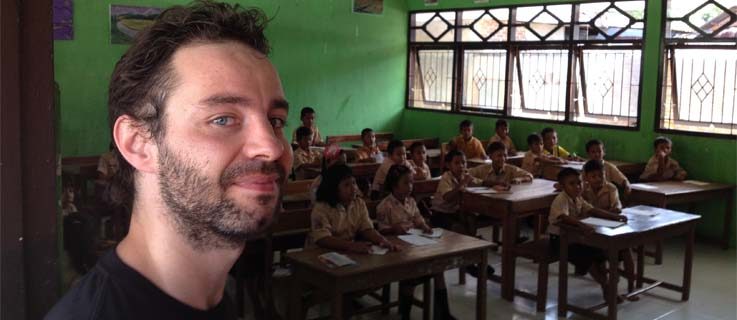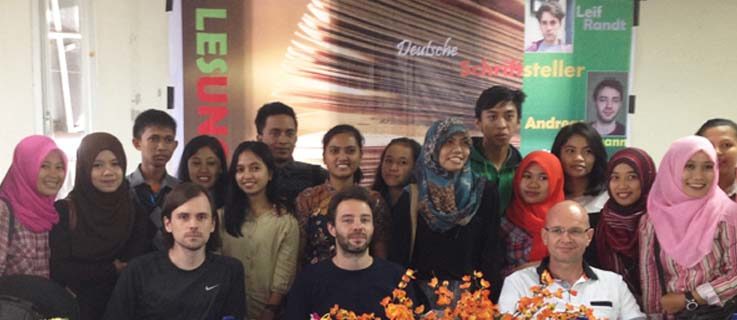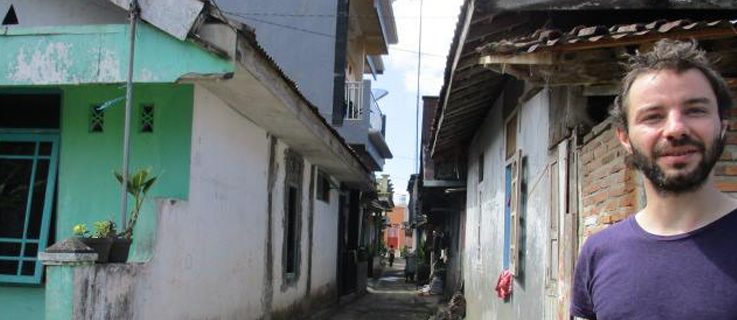Literature | Essay
Andreas Stichmann / Makassar Race 2015
Makassar Beach, 6 June 2015
Cover your eyes with your hands, count down from ten to one and remove your hands. And then be Gufa, son of a fisherman, born in Makassar. Jug ears. Blue shirt. Quiet voice. Pleasant, inner masculinity. The morning prayer at five-thirty, soup for breakfast – the day has begun. You stand barefoot in the silt and wave to your friends sitting on the landing. One looks at his smartphone, the other gives a hand sign you don’t understand. You carefully release the boat. You lick your salty lips. You look into the dawn that is lit like an orange brain on the horizon. Because it looks so strange, you take a photo of it and post it on Instagram with the caption “brain”. You sit down on the wooden bench in the boat and steer while the aging engine goes through the gears. Good so far.Do you see how the garbage surges in the sunshine? Do you see how the foreigner sitting with you in the boat looks on so foolishly? How he scribbles nervously in his notebook? As if he wanted to sketch you?
Pale. Long nosed. Fisherman’s hat on his head. Simply imposes himself on you. Says something about a German newspaper for which he is writing something, and then he asks hectically whether your great-grandfather was a fisherman. Whether your family is very conservative, and if yes, also concerning hitting? Whether it’s true that there is a rift between the generations. That much to the displeasure of their fathers some young men work in the IT industry instead of becoming fishermen. Whether it’s true that westernization is pervasive?
You smile. You put on an impenetrable, friendly face. And if you don’t understand a question, your smile becomes even broader. Harmony, harmony, harmony. All the while maintaining an inner calm, restrained body language, becoming ever quieter and softer as the other person becomes ever more energetic. And it is also friendliness that he now requires of you to turn off the engine so that you can focus better on the questions, which perhaps get on your nerves. But would you show that? Would you even stop smiling a second? Would you ever look annoyed? Offer the foreigner a perfumed cigarette. Offer him a fruit candy. And another perfumed cigarette. What does he want to know? Is it true that the young people on the landing are talking about the Grammy Awards in Los Angeles?
That’s what he wants to know. Whether he understood that correctly? Yes. Well. Maybe. Why should one not talk about the Grammy Awards? Don’t Germans ever talk about the Grammy Awards?
Your journey continues. To the beach of Pulau Laelae. You see the seagull circling over the murky water. Unggul, the mayor, is already waiting on the shore of the island. He is getting bigger and bigger and then suddenly is part of the communications situation that is somewhat stuck. He wears a black jogging suit. Next to him: the huge sacks full of plastic waste that one can now make money collecting. Does garbage interest the Germans? Of course. Garbage interests Germans. He gets out and shakes Unggul’s hand. Unggul flinches because he is obviously not prepared, because he probably does not yet know that a vice-like handshake and a deep look into the eyes is normal for Germans. A greeting that exhibits over-aggressive body language: NEYES TU MIET YU!
The sun now looks pretty above the palm trees. Unggul explains: Yes, the fishing boat always collects the garbage on Tuesdays. Yes. President Jakobi is quite OK, he says, at least well meaning, things are changing, as far as he can say not getting worse. But no, the thing about the garbage has nothing to do with the president. That was decided here on the island. Whereupon the German then says “Tree Makassi” for the information, and Unggul says “You’re welcome”, and then Unggul and the German laugh together before Unggul goes off to pray. And the wind whistles in the empty plastic bottles that stick out of the plastic bags like flute necks. And the coconuts on the palm trees look down to you, so one says. Each one has a downward looking black eye so that they don’t fall on anyone’s head when they fall. And this pleases the German. Nothing can happen to anyone. And because he now looks at you more calmly, and because you know he wants to know what it is like to live here, you say, because you want to help: it’s maybe a kind of drifting-into-the day. More relaxed. Perhaps it’s that we have more time than you have in Germany. We do everything more slowly – yes, yes, that’s probably it. And defensively: perhaps that we do everything too slowly. While you Germans are so diligent?
You work.
You load the garbage bags into the boot. You eat the salty bananas brought by Unggul’s wife after the work is done. Her name is Sha and she smiles (how else?) inside – with this inner self-awareness. The German takes off his fisherman’s hat and says something too loud into her face, as if speaking down into a crater: I LIKE THIS SALTY BANANAS. She thanks him and goes. And you journey back?
Nope.
Now come the primary school children on the run from the school and discover the German, and he says he already knows them from yesterday. They had taken photos with him, but it has to be done again. They encircle the German. They wrap around his legs and hook onto him left and right. And he freezes firmly with his smile. He stands and stands. He doesn’t understand that he has to free himself actively. Instagram, Facebook, Pinterest: photophotophoto.
Fortunately, Unggul returns. In the meantime he has changed into a shirt and trousers. Behind him is a somewhat younger man who has the beautiful name Irwan. He is stocky, wears a three-day beard and a gray business suit. He shakes the German’s hand very strongly. He lives in Texas and is visiting home. He says there is a small party at his brother’s house in the evening. All present are invited, including the children. The party will begin at nine. Approximately.
Makassar, 10:30 p.m.
Cover your eyes with your hands, count down from ten to one, remove your hands and be the German. Find yourself on the rear of a motorcycle, in front is Gufa, the young man who has selflessly taken care of you the whole day. You try to trust his driving skill. You try to enjoy the adrenaline rush while he races over the beach promenade. You hold on very tightly. You close the visor. You stifle a scream as the motorcycle turns onto the main street. The traffic is always this way – certainly Gufa knows how to survive in this traffic, right? Whistles. Horns. Revving engines. And you accelerate again, leaving town and passing the entwined interlocking houses. Banana trees. Plastic goods shops. And an actual minaret factory. It looks like a miniature town composed of fairytale towers. Or is it one? And then there’s a bend in the road. And the bend becomes even sharper. And women with flapping headscarves shoot by on motorcycles while telephoning. A man drives by one-handed while holding a child with one arm. But the traffic is always like this here – you can trust Gufa, right?You close your eyes. You are completely in the helmet Gufa has given you. You do something that is similar to praying. Or is it praying? Should you talk with Gufa about praying?
The cycle stops. You suddenly arrive somewhere and the helmet is pulled off your head with a popping sound. Hot sweat runs down your neck. All around you: night. A few stars have somehow penetrated the smog. And as before, there is Gufa’s soft beardless face, with which in the meantime you have become well acquainted. It is completely relaxed, as if he had just had a nap. Gufa, you say Indonesians have more time, but then why do you race so fast? Isn’t that rather fatalistic? Guileless? Are you totally resigned to fate? Crazy?
But he has already gone ahead. He has gone toward the voices that are moving in the darkness. He calls you to join him and you both enter a garden: about twenty people sit there on rugs, men and women of all ages, with headscarves and without, in colorful robes or jeans. They look at you as if they expect you. But no one introduces themselves – would that be too intrusive? Probably. OK, doesn’t matter. Don’t force yourself on others. Perhaps so that you can understand the rhythm of the group? You sit down on a cushion. The faces all seem to have the same temperature, as if they belonged to the same creature peacefully resting here. Or does it just appear to you that way? Are there minimal differences in the degree of softness of individual people? Is it simply not evident? Are they actually hardcore individualists?
It is more of a forest than a garden you now notice. A kind of underwater situation. The lanterns in the trees give off a milky blue light. The crowns of the trees look like plants that are moved back and forth by water. “Soaptrees,” explains a girl named Dwy. They do in fact smell like balsam or anise or something like that. And Dwy looks at you with large eyes and asks whether you want alcohol like a couple of the young men over there are drinking.
Yes, the German would surely like alcohol can be heard from all sides. There’s a bit of movement and a large glass full of strong self-made coffee liqueur emerges from a group and is passed to you. You hear that no alcohol has been available in the supermarket for three months. Half of the group thinks this is good, the other half not, and you think: there are indeed differences in opinions, and yet expressed in a conciliatory tone. The opinions are not easy to understand because they need to be translated by Dwy, who acts as my interpreter, amazingly, since she is just 11-years old and speaks perfect English. Better than Gufa and you and everyone else here. She’s so reflective that you could believe you’re dealing with a 50-year-old psychologist. She sits there like a little penguin with her headscarf, surveys you with her disturbingly clever eyes, and translates the answers of the adults, who seem rather to bore her. After a while the responses of the adults ebb and she moves closer to you with her face, on which is written: Any questions?
You: Prayer. Why do you pray, Dwy?
Dwy: Oh, I do that just for me. I believe in the practice of prayer. You have to understand it as an exercise in concentration, a mental discipline that you do not necessarily have to consider spiritual. It structures my day, you know? It sorts the mind. You should try it some time!
You: Oh, yes, but does that work? I mean don’t you have to be –
Dwy: Devout? That’s good, but you can also do it just for yourself. You look a little confused.
You: You mean, I... I could also... five times a day?
Dwy: Oh, look. My father is going to give a speech. He likes to talk, you know?
The businessman Irwan Rusmini from Texas has risen and raises a hand. He speaks into a small microphone and goes back and forth like an American presidential candidates at a television debate. He even puts his hand briefly into this trousers pocket while speaking and casually rubs his three-day beard, which is very atypical. It’s a company anniversary thank-you speech, Dwy translates. He hands out mobile phone cases and USB sticks to the children of people with whom he grew up. He talks about the new app his company has developed; it bridges the gap between traditional and digital media. It’s called Makassar Race 2015. It is a kind of paperchase app with which you can experience the history of a place as a game. The app finds all of the culturally rich sites in the surrounding area, translates Dwy. If you correctly answer the questions about the history and solve the tasks, you not only learn something but also have the chance of winning a 6-month stay in Texas. The principle is called Gamification. This is now a future concept.
The business man Irwan Rusmini explains in English that he wants to give something back because he has been so richly blessed! The future and the past, East and West, give and take (he looks at the gathering with a serious presidential mien) are united in this app he gifts to all gathered here, and it would give him great pleasure to be able to soon welcome someone from tonight’s gathering in Texas.
At the end he doesn’t say thank you but rather “Tree Makassi” (= terima kasih) because according to Dwy it sounds more beautiful and means more than the dismal “thank you”. Namely what? What does “Tree Makassi” mean?
But by then you are already drunk, befuddled by the heat and spicy food, and the coffee liqueur was really high-powered. Everything is so colorful. Green lanterns. Blue. Red. Nutmeg trees. The large lizards painted on the wall. And Dwy? Dwy with her funny happy Texan-Indonesian look?
Ah, there she is again! In the almond fragrance by the soaptrees. And there is Gufa, too, who is sitting in a tree and wants to give her a hand up. You give her a leg up and climb up after her. The three of you sit there together in the tree and Gufa smokes perfumed cigarettes. Tree Makassi means: giving and taking. And that’s good.
Somewhere over Sulawesi, 5:30 a.m.
Such a plane is also nice. Be an airplane. For example. Fly through the dawning morning. Accommodate 150 sleeping people in you. Fly over a country that consists of 17,508 islands. I mean you have to imagine it: seventeen-thousand five-hundred and eight. Be one of those golden dots. For example. Or be a cloud. Be the stewardess. Put yourself into the state that Dwy described to you. Fantasize yourself into it. Be a large all-permeating consciousness. Be the tomato juice. Be the sandwich. Be the orange-colored sun.



